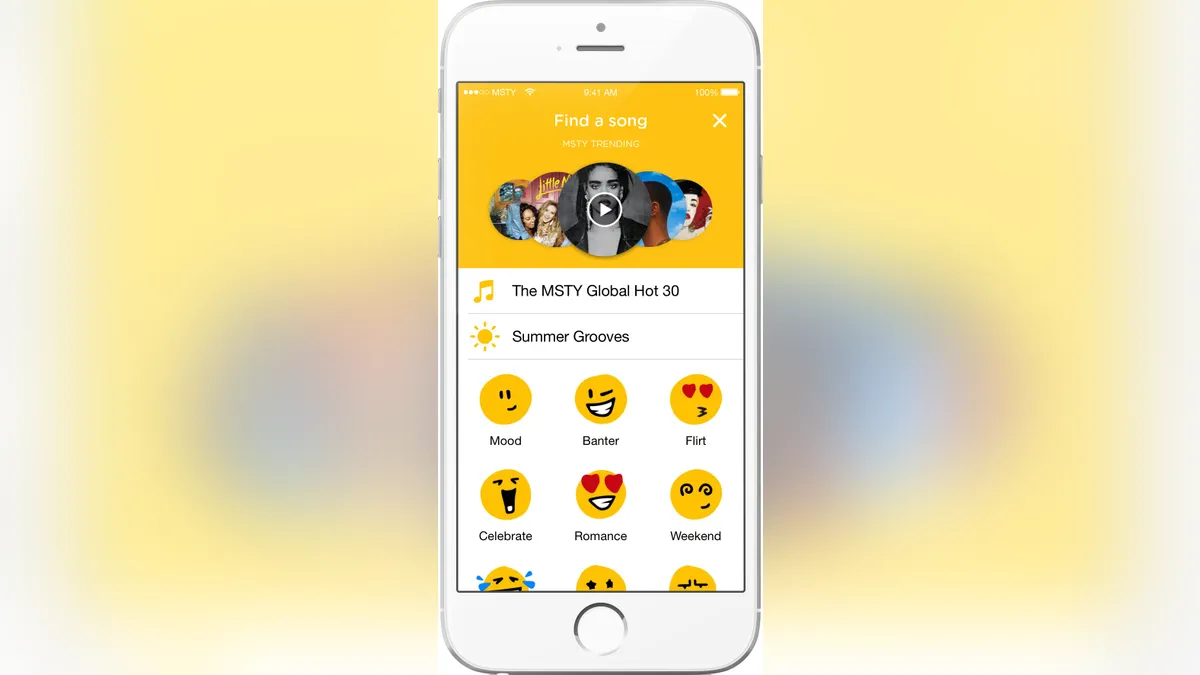
MSTY screenshot (MSTY)
A new mobile messaging app launched this week aims to give new meaning to the term “mood music”. In fact, London - based MSTY (My Song To You) claims to be blazing a trail with its short but sweet notes, something co-founder and CEO Grant Bovey is banking on to stand out in a crowded “appscape”.
“Our content differentiates us,” Bovey told Fox News.com. “All the music is legal. I’m aware other apps mine music illegally, but I wanted the support of the industry.”
Forrester Research has noted the importance of creating an experience to keep people on an app: “Mobile moments are the new competitive battleground. Mobile messaging creates mobile moments, or the ability to serve your customers proactively in their moment of need,” it said, in a report released last year.
And MSTY is trying to do this on mobile by tapping into what are known as Music-Evoked Autobiographical Memories (MEAMs). In other words, when you hear a song it often makes you instantly recall strong memories and emotions from a specific time and place when that song was playing as part of the soundtrack of your life.
“MSTYs definitively can change your mood,” Bovey asserts, adding, “They trigger something else that other messaging apps don’t.”
After all, WhatsApp delivers text, Instagram shares pictures, and Livetext features video without sound, but MSTY aims to put the emotion back into emoticons by adding a soundtrack.
While Bovey says the app can be enjoyed by almost all ages, it’s likely to skew younger as research shows teens are the heaviest texters and messengers - nine out of 10 teens with mobile phones send them according to a Pew study. That report showed social sites and messaging apps dominate time spent online with the typical teen sending and receiving 30 texts per day.
A separate Pew study shows half of teens communicate with friends via text message, a form of communication that's more prevalent than voice calls.
You Send Me: How MSTY works
The app’s premise is to function as easy as 1, 2, 3: select a song (sorted by moods or decades), add one of the app’s stock backgrounds or one of your own photos from your phone, and then type a brief message that you can center on the picture and then send a MSTY friend. If they haven’t downloaded MSTY, they will then receive a notification asking them to get the free app.
There’s also a preview button to make sure before sending the MSTY that you’ve picked out just the right anthem to proclaim your love or a silly song and photo to elicit laughter from a friend having a bad day.
While MSTY is an easy way to send fun, flirtatious, or funky tunes and visual messages, there is no way to delete them once they’ve been sent. You can forward them to friends, or yourself to keep it top of your personal playlist.
There’s currently no way to store MSTY’s so after you get 50 messages the oldest ones will be deleted as incoming messages replace them.
Bovey promises version two will include the ability to broadcast MSTYs to groups and download your favorite notes.
There’s currently no advertising on the app, as the company focuses on adoption. But the company may find it expensive trying to customize playlists in more than a handful of the 127 countries MSTY is launching in today and of course, a rival messaging app could turn on music.
Bovey told FoxNews.com that MSTY has the rights to 22 million songs from the major labels, plus cooperation from Apple. The beta version of the app that FoxNews.com demoed featured a direct link from the MSTY app to Apple Music for streaming or purchase on iTunes.
The MSTY CEO is quick to point out that the songs have been hand-curated by humans, not algorithms, to a 30-second clip that includes the chorus or other seminal sounds expected to pack the most emotional punch
Bovey is confident that customizing will pay off over time in increased engagement and, after acquiring all those music rights, he says a copycat “can’t do it overnight. It takes substantial time and money. And if we’re successful, the next person may have to write a bigger check (to get the rights).”








































